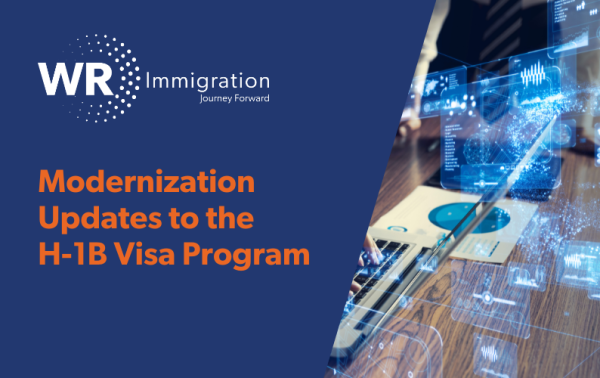On December 17, 2024, the U.S. Citizenship and Immigration Services (USCIS) released significant updates to the H-1B visa program, aimed at modernizing the system, clarifying procedure, and codifying longstanding policy. These updates refine key aspects of the H-1B program to improve clarity, ensure compliance, and streamline processes for employers and beneficiaries alike.
Among the major changes are clarified definitions for specialty occupations, requirements for when amended petitions must be filed, and updates to H-1B cap exemptions. For example, to qualify for H-1B status, the requisite academic degree must be directly related to the H-1B position duties. Additional measures focus on reinforcing H-1B program integrity, including codified authority for the government to conduct H-1B site visits and stricter criteria for the placement of H-1B workers at third-party worksites. The rule codifies USCIS’s policy of deference to prior approvals, meaning that officers should defer to the fact that an H-1B petition was previously approved unless there have been changes that could impact the H-1B status.
The revisions also introduce greater flexibility, such as extending the validity period for H-1B cap adjudications beyond October 1st for students transitioning to H-1B status. This would permit larger “cap gaps” so that individuals with F-1 status would not have to stop working if the H-1B petition has not been approved by October 1st. Other updates, including new guidelines for beneficiary-owned entities and bona fide job offers, highlight USCIS’s focus on ensuring that the H-1B program remains both effective and responsive to the evolving labor market.
Key points in the rule include:
- Specialty Occupation Definition: Clarification and codification of the specialty occupation standard, requiring a direct connection between the required degree and the duties of the position.
- Amended Petitions: Petitioners must file an amended or new petition for material changes in employment terms, including changes in the place of employment outside of the MSA prior to the change taking place.
- Deference Policy: USCIS will defer to prior determinations of eligibility unless there was a material error, change in circumstances, or new information impacting eligibility.
- Evidence of Maintenance of Status: Petitioners must provide evidence that the beneficiary maintained their nonimmigrant status before filing for an extension or amendment.
- Elimination of Itinerary Requirement: Removal of the itinerary requirement for H programs.
- Validity Period Adjustments: Allowing H-1B petitions to be approved or extended if adjudicated after the initially requested validity period end-date.
- H-1B Cap Exemptions: Revised requirements for qualifying for H-1B cap exemption, including modernized definitions for nonprofit and governmental research organizations.
- Automatic Extension of Authorized Employment “Cap-Gap”: Extension of the cap-gap end date from October 1 to April 1 (of the subsequent year) for students changing status to H-1B.
- Bona Fide Job Offer: Petitioners must establish a bona fide position in a specialty occupation available for the beneficiary as of the requested start date, and USCIS can request contracts or similar evidence.
- Beneficiary-Owned Entities: Initial approval for petitions filed by entities where the beneficiary has a controlling interest is limited to 18 months.
- Third-Party Placement: USCIS will consider third-party requirements for the beneficiary’s position in assessing specialty occupation qualifications.
- Site Visits and Compliance Reviews: Codification of USCIS’s authority to conduct site visits and take adverse action against non-compliant employers.


